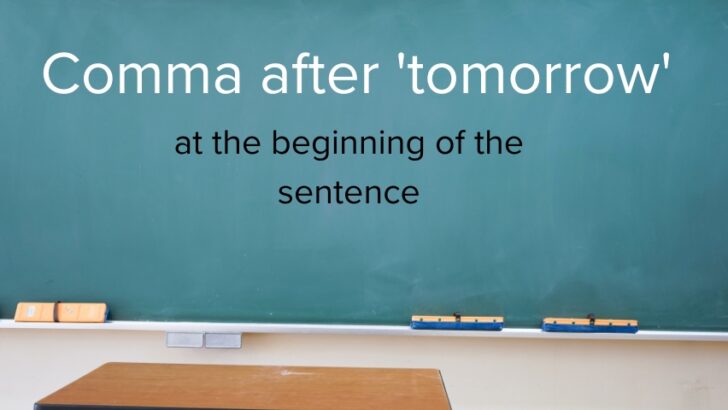Today, we are talking comma rules again.
More specifically, we are talking about whether ‘tomorrow’ needs to be followed by a comma when it appears at the very beginning of a sentence.
The opening sentence of this piece should have already guided you towards the correct answer…
Do you need a comma after “Tomorrow” at the beginning of a sentence?
Whenever ‘Tomorrow’ is used at the beginning of a sentence and serves as an introductory element, specifically functioning as an adverb of time, then it needs to be followed by a comma.
Temporal expressions at the beginning of a sentence — Comma Rules
We have just seen that a comma is necessary when “Tomorrow” appears at the very beginning of the sentence.
This is obviously not just the case for “Tomorrow” but also other temporal expressions like:
- Today (See our article on Comma after Today)
- Yesterday (See our article on Comma after Yesterday)
- During this time (See our article on Comma after During this time)
- Now (See our article on Comma before or after now)
- Recently (See our article on Comma after recently)
- Eventually (See our article on Comma after eventually)
- Sometimes (See our article on Comma after Sometimes)
Now, the above list certainly is not exhaustive.
The main takeaway here for you is that whenever you have a temporal adverb (such as tomorrow, yesterday, today, recently and so on) at the beginning of the sentence, then a comma comes after it.
These temporal adverbs are commonly known as ‘Adverbs of time.’
However, not all of the words above are always used as temporal expressions. And even when they start a sentence, they could also have different functions.
For instance, the adverb “now” in “Now is the time to act” does not function as an introductory element. It is actually a subject complement in this case and, therefore, it is NOT followed by a comma in this particular case.
Here are some examples for you where ‘Tomorrow’ is used as a temporal expression at the very beginning of a sentence:
[table id=93 /]
Hey fellow Linguaholics! It’s me, Marcel. I am the proud owner of linguaholic.com. Languages have always been my passion and I have studied Linguistics, Computational Linguistics and Sinology at the University of Zurich. It is my utmost pleasure to share with all of you guys what I know about languages and linguistics in general.

